Peg Herring's Blog, page 13
June 13, 2016
What's a Printers' Row?
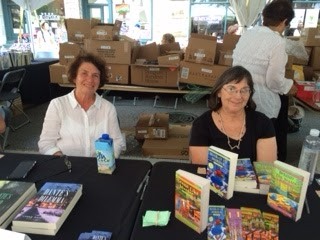
A long time ago, there was an area in Chicago where book publishers tended to locate. They started a book festival, and the rest is history. Though the book publishers are mostly gone, every year in June they take to the streets, closing them down to traffic so tents can be set up for blocks and blocks representing book sellers, book publishers, and everyone associated with that.
This year it was mid-90s all festival weekend, but since it was Chicago, there was a breeze off the lake that saved us all. I gathered with a group in a tent wrapped in crime scene tape: Midwest Mystery Writers of America and Centuries and Sleuths Bookstore. With me were well-known authors like Sara Paretsky and Marcia Clark as well as lots of writers like me, not so well known but just as hard-working.
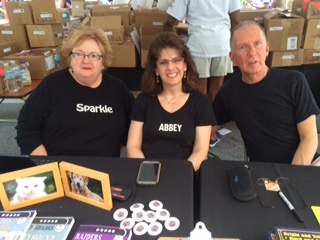
It's always fun to get together with authors I've known for years and meet authors I've never met. Some I know online and others I've never heard of before. I confess to a desire to read all their books, but of course that's impossible. I keep trying, though!
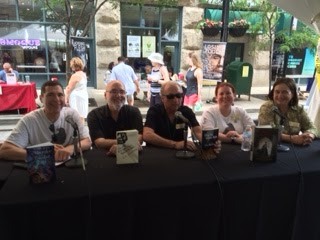 Since we were already in Chi-town, John and I visited the museums: Science & Industry, Shedd Aquarium, and the Field Museum, where we got to see the terra cotta warriors from China. I think I managed to impress my husband in all those places!
Since we were already in Chi-town, John and I visited the museums: Science & Industry, Shedd Aquarium, and the Field Museum, where we got to see the terra cotta warriors from China. I think I managed to impress my husband in all those places!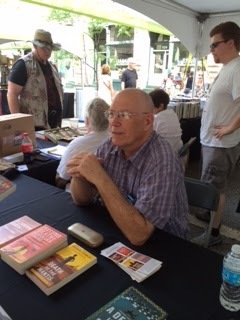
Published on June 13, 2016 03:14
June 6, 2016
Too Many Good Books
 I'm in the enviable position of having a surfeit of good books.
I'm in the enviable position of having a surfeit of good books.The Distant Hours by Kate Morton: about a third through it.
The Summer Before the War by Helen Simonson: halfway.
Sparrow Migrations by Cari Noga: three-quarters done.
Murder at the Brightwell by Ashley Weaver: just started but already loving it.
As you might guess, I have books in different rooms and read them in snatches. All but Sparrow Migrations are historical. Only Murder at the Brightwell is a mystery, though Morton's books have a discovery aspect that adds mystery to them. All are hard-to-put-down types, and it's rare that I have four at once that call to me when I'm not reading. (I also have a book on my phone, but it's only mildly interesting, so that reading progresses in spurts of boredom as I wait for John to take care of things I can't because of this silly foot (which is healing nicely).
Sadly, I have an edit to do on my own stuff, so all my reading for fun will have to wait a day or two. Still, it's nice to know I have lots of good stories waiting for me!
Published on June 06, 2016 05:13
May 30, 2016
The Bitter End
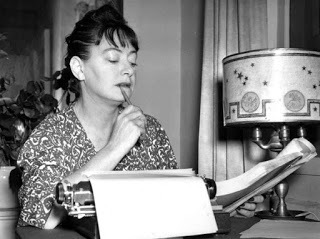 Not me. My hero, Dorothy ParkerI posted on Facebook the other day that each book I write comes to the point where I'd like to tell the reader, "I've brought you this far, now you finish it!"
Not me. My hero, Dorothy ParkerI posted on Facebook the other day that each book I write comes to the point where I'd like to tell the reader, "I've brought you this far, now you finish it!"I was surprised to read in the responses I got that it's been done. Can't imagine reading a whole book and being left in the lurch like that. As one respondent pointed out, "As the author, you know the characters better than anyone else. You have to tell us what happens to them."
Yes, it's the author's responsibility to sort out the mess she's created. Still:
1) I'm tired of them at that point. Like one's children, an author loves her characters, but there are times when she'd like to love them from a galaxy far, far away.
2) Some readers won't be satisfied. I've heard from some who wanted more romance (okay, sex) between the characters to end the book. One reader complained that a certain character would never have given in and obeyed the bad guy who stuck a gun to her head. (Maybe I should have said, "He pointed the gun at her and she said, "Stop that," so he dropped the gun, gave himself up to the police, and admitted everything.) In another instance, a woman at a book group expressed vexation that I never told what happened to a certain very minor character at the end of the book. (She lived her life--I guess.)
3) The biggest reason I don't look forward to writing the end is that it's hard, especially in a mystery, where a writer can't just fade out, as some literary novelists do. There has to be an accounting of some sort, and though I've had in mind all the way along who's guilty, making the ending logical, exciting, and summary of all previous events takes concentration. Every strand should pull together and make a nice whole. There shouldn't be a point where the reader thinks, "That wasn't fair."
I've read books where the killer came out of the woodwork, like an ant when dinner's over, and it irritates me. The clues should be there, and the ending should make it clear it couldn't have been anyone else. One of my favorite comments ever from a reader of my work was, "I didn't figure out the ending, but I should have been able to."
If you haven't guessed by now, my task this week is to end a book I've been working on. I know how it ends. I know where each character needs to step in and do his part.
I just haven't written it down yet.
Published on May 30, 2016 04:21
May 23, 2016
An Argument for Better Arguing
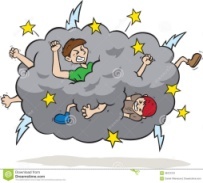 "But can't you see how wrong you are?"
"But can't you see how wrong you are?"Centuries ago, when I was in high school, I took up argumentation. I joined the debate team because my sister had done well there, and because the coach cornered me in the hallway and asked me to.
I loved it. Research, constructing cases, looking for weaknesses in the arguments of others, and organizing information so I could get at it easily. It might not sound like everyone's cup of tea, but it was certainly mine. I ended up ranked in the state and got a scholarship to college.
Debating in college was even more fun. The competition was tough, but we traveled to places I'd only read about and formed a close-knit group that loved to--you guessed it--argue. Play with language. One-up each other. Argue some more.
Debate is formal argument, and it doesn't bear much resemblance to the real-life version. One can try tossing out lies and false evidence, but the other team is likely to call her on it. [Great example: we once debated a team that based their whole case on a plan developed by the U.S. army. As they laid out their points, it sounded really good. However, my partner recognized the reference and went digging through her evidence cards. She was able to report from a later article that the army had abandoned the plan because it was flawed and unworkable. That pretty much ended that debate!]
In a formal debating situation, everyone is similarly armed with intelligence and background research. Results are decided by a judge who knows the subject, so there's little hope he or she will be fooled by tricks or displays of "personality." [Although we did have a judge once in college who gave us the win because he said it was pretty even as far as speaker points but we were dressed better.] In real life, people look for easy answers, don't do independent research, and stick with their beliefs even when the rest of the world thinks they're crazy to do so. To err is human, and we all do it.
Debaters often have to take both sides of an argument, which taught me that there is no "right" answer in most cases. Arguments can be made for just about anything, and tough subjects come down to emotional reactions we must all be aware of. Wise people look past their emotions and try to find truth. Not so wise people blame "them" for trouble and convince themselves that things would be better if we could just get rid of all those pesky _____ (Answers will vary).
One of the first things a debater learns is that she must listen to what the opponent says. Once she understands his arguments, she must apply logic and evidence to see where the weaknesses lie. You're going to build a wall. How will that get done? You're going to send everyone to college for free. Where will the money come from? You're going to overturn Citizens United. By what process? NOTE: Please don't write to explain those answers to me. I know what the candidates have said. I'm simply appalled by voters who think that when a person is President, he or she can just wave a wand and everything that was promised will happen. Um, Congress? Remember? Our legislative branch?
Listening and reasoning is a far cry from the screaming we see on TV and on social media. People talk past each other, belittling those who disagree with their views. Do we really think we can change anyone's mind by telling them they're stupid? Can we sway undecided voters by demeaning each other? Does anyone think the media isn't encouraging bad behavior and ridiculous statements? In most cases, their goal is to get people to watch/listen, not to create an informed electorate.
One of the most important things about competition debate was that we never engaged in personal attacks. Worse than useless (and very bad form); it was actually counterproductive. How much better would it be if we asked why a person supports a particular candidate and then talked calmly with him about it? He probably won't convince you to change your mind, but in the process of explaining his choice (if you don't get angry or uppity but just keep asking questions), he might be forced to admit there are weaknesses in his candidate's platform. Of course, he's likely to be prepared with his own ammunition, and you'll have to defend your choice, too. You'll have to admit to weaknesses on your side, because that's the way real life goes.
I'm heartily sick of politics, as is every thinking person I know. We need the process, I suppose, and we will go on as a nation no matter what happens, but I sure wish the American public would take some lessons from formal debate.
Published on May 23, 2016 04:46
May 16, 2016
Sale! Books! Read!
I could give a long and not very interesting explanation of why I have an overload of print books in my office, but I won't bore you with that.
Let's get to the sale: I'm offering some of my older books at discounted prices. If you're interested in them for yourself or for gifts, this is a great time to get them. No booksellers between you and me, although I do have to charge an extra $5.00 for postage if you want them mailed to you. If you live in northern Lower Michigan, we can arrange to meet somewhere and save you a few bucks.
You can find out more about the books here or on Amazon (where they know everything!)
 If you're interested, email me at pegfish@yahoo.com and we'll get this done.+
If you're interested, email me at pegfish@yahoo.com and we'll get this done.+
Let's get to the sale: I'm offering some of my older books at discounted prices. If you're interested in them for yourself or for gifts, this is a great time to get them. No booksellers between you and me, although I do have to charge an extra $5.00 for postage if you want them mailed to you. If you live in northern Lower Michigan, we can arrange to meet somewhere and save you a few bucks.
You can find out more about the books here or on Amazon (where they know everything!)
 If you're interested, email me at pegfish@yahoo.com and we'll get this done.+
If you're interested, email me at pegfish@yahoo.com and we'll get this done.+
Published on May 16, 2016 02:00
May 9, 2016
Biblioboard
I heard about an e-book program for libraries called Biblioboard. Books are offered there through your local library, so you can borrow e-books just like you borrow print books. The authors don't get paid. It's a way of getting people acquainted with your work so that (maybe) they'll buy at some point.
I got notification that some of my books are now available there, but when I tried to look, I had to choose a library. Our local wasn't listed and I'm not a member of any other library systerm, so I can't look to see what's there. I think it might be the Maggie Pill books, the Sleuth Sisters.
If anyone knows about this program or is part of it, I'd appreciate hearing which books of mine are available.
I got notification that some of my books are now available there, but when I tried to look, I had to choose a library. Our local wasn't listed and I'm not a member of any other library systerm, so I can't look to see what's there. I think it might be the Maggie Pill books, the Sleuth Sisters.
If anyone knows about this program or is part of it, I'd appreciate hearing which books of mine are available.
Published on May 09, 2016 05:29
May 2, 2016
"How Are the Book Sales Going?"
 It's a question I get quite often, and sadly, the most correct answer is, "I don't know."
It's a question I get quite often, and sadly, the most correct answer is, "I don't know."With my first book, back in 2008, I really had no idea how well it was selling for almost two years, and even then the numbers I was given didn't mean much because I knew so little.
Publishers pay an advance on a book when they offer a contract. The author gets "paid" in that way, except then the publisher holds that much money back from royalties as the book sells. If an author gets $100,000 (don't I wish), the book has to earn that much back for the publisher before she gets more money (It's called "selling through"). Add to that the fact that bookstores stock books with the understanding they can return them if they don't sell within a given time. That means a publisher can't count a sale as a sale until they get the returned books and subtract them from what really sold. (Confused yet? That's the current state of publishing.)
Those two things add up to a long wait time for authors. Many books never sell through, so the author never sees a cent after that initial advance. Though I'm one of the lucky ones who receives regular royalty checks, I missed a whole year's worth when my main publisher went bankrupt a while back. That money just disappeared into the court system.
As you can see, the traditional publishing system makes it hard to tell which books are selling. When I'm asked about sales, all I can say is that once or twice a year, there's a check.
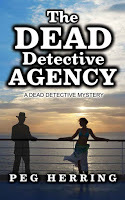 New tools make it a little easier to find good information in certain venues. Amazon and Audible are great about giving a daily update of how many of which books sold today. It's nice not to wait years to get paid, and there's even a chart that tells how many pages of my books have been read on Kindle each day. That can get to be too much information, but it is fun to see which books people are actually reading and how fast they're getting through them.
New tools make it a little easier to find good information in certain venues. Amazon and Audible are great about giving a daily update of how many of which books sold today. It's nice not to wait years to get paid, and there's even a chart that tells how many pages of my books have been read on Kindle each day. That can get to be too much information, but it is fun to see which books people are actually reading and how fast they're getting through them.Something that's interested me lately is that all my books, even some of the older ones, are selling pretty steadily. That means (I think) that people are reading one book then seeking out more of what I've written. Since my topics are widely varied within the mystery genre, I don't know if that's a good thing or not. Someone who loves Simon & Elizabeth might not react well to Loser the Loser or Seamus the Dead Detective. I like to think if a reader is only looking for a good story, she won't be disappointed.
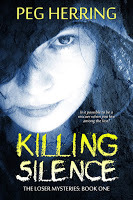
How are the book sales going?
Honestly, it's fun to see sales climb. It's nice that money appears in my bank account regularly. But I'll never be an author who chases financial gain. I went into this field because I love writing books that make me and a certain set of readers happy. Sales are just one way to tell if I'm doing that.
Published on May 02, 2016 04:23
April 25, 2016
The Way a Stranger Sees You
 Yesterday I got a draft of an article someone plans to publish about me in a collection listing contemporary authors. Of course it's flattering to be included, but other emotions arise as well.
Yesterday I got a draft of an article someone plans to publish about me in a collection listing contemporary authors. Of course it's flattering to be included, but other emotions arise as well.First, curiosity. How did they find all this stuff about me? Some of it's correct, some is outdated, some is just plain wrong (when was I ever an editor?). Some I can't figure out: how did they find out that my dad sold used cars and my mom taught school?
Second, doubt. How well do the parts balance? The article seems to dwell on my play-writing, which was actually a pretty short part of my career. It did come first, but I soon realized I wanted to write novels and moved in that direction
And finally, uncertainty. What does it all add up to? Well, they left out a lot, so I plan to submit some additional information, but it's kind of nice to see it all up there and read what reviewers have said about my work. (I try not to read reviews, being overly critical of myself anyway.)
Of course we don't get a real picture of those we don't know from reading about them. We don't see them talking baby talk to the cat or folding loads of laundry between writing suspenseful chapters for the next novel.
I guess it's enough if we get an snapshot in time. This is Peg Herring...sort of.
Published on April 25, 2016 03:58
April 18, 2016
The Gifts I Buy Myself
I buy myself presents all the time: they're called books.
Sometimes they're Kindle books, although I'm often irritated by the inflated cost of books by big-name authors. If mid-list authors' books can be produced for six dollars or less, why can't everyone's?
I know, supply and demand, but there isn't the cost in e-books that there is with print: no print cost, no warehousing, no shipping.
But I digress.
In addition to Kindle books, I also buy print books. Lots of them. No less than three, sometimes more, bookstores exist where the clerks smile when they see me coming. They know I'm buying.
Sometimes my purchases result in entertainment for few hours, and that's great. People gripe about "affording" books, but where else do you get eight hours of entertainment for under thirty bucks?
The best times are when my purchase results in absolute rapture. I got lucky last week with THE NIGHTINGALE on my Kindle, which was wonderful. On Thursday I picked up (at a nice young clerk at McLean and Eakin's suggestion) BE FRANK WITH ME.
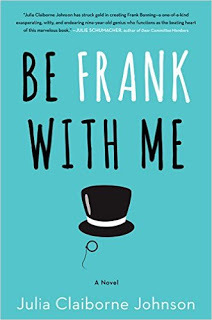 Oh, the joy.
Oh, the joy.
I can't tell you where it's going for sure yet, because I haven't finished. It concerns a young woman who's sent to smooth the way for a famous author so she can get a book written. Smoothing the way involves dealing with Frank, a kid who's unique, hilarious, frustrating, and endearing. If you love unique characters cleverly presented, you will love Frank, and his mom's pretty interesting, too.
One of the blurbs mentions that the reader wants to
read the book again later, just to spend more time with Frank.
That's like double value for your money. How great is that?
Sometimes they're Kindle books, although I'm often irritated by the inflated cost of books by big-name authors. If mid-list authors' books can be produced for six dollars or less, why can't everyone's?
I know, supply and demand, but there isn't the cost in e-books that there is with print: no print cost, no warehousing, no shipping.
But I digress.
In addition to Kindle books, I also buy print books. Lots of them. No less than three, sometimes more, bookstores exist where the clerks smile when they see me coming. They know I'm buying.
Sometimes my purchases result in entertainment for few hours, and that's great. People gripe about "affording" books, but where else do you get eight hours of entertainment for under thirty bucks?
The best times are when my purchase results in absolute rapture. I got lucky last week with THE NIGHTINGALE on my Kindle, which was wonderful. On Thursday I picked up (at a nice young clerk at McLean and Eakin's suggestion) BE FRANK WITH ME.
 Oh, the joy.
Oh, the joy.I can't tell you where it's going for sure yet, because I haven't finished. It concerns a young woman who's sent to smooth the way for a famous author so she can get a book written. Smoothing the way involves dealing with Frank, a kid who's unique, hilarious, frustrating, and endearing. If you love unique characters cleverly presented, you will love Frank, and his mom's pretty interesting, too.
One of the blurbs mentions that the reader wants to
read the book again later, just to spend more time with Frank.
That's like double value for your money. How great is that?
Published on April 18, 2016 04:00
April 11, 2016
Disposable Bad Guys
 There's been a discussion on one of my chat groups concerning the casual killing of "bad guys" in movies and books. There are two schools of thought.
There's been a discussion on one of my chat groups concerning the casual killing of "bad guys" in movies and books. There are two schools of thought.First, it's escapist fiction, so it's supposed to by over-the-top. I enjoy the characters in NCIS-LA, but in almost every episode there is a scene where they blow away everyone who might be a bad guy.
No one ever investigates afterward. Nobody gets put on administrative leave until it's determined the shooting was "righteous."
No foreign government demands the U.S. answer for agents who shot up a whole neighborhood. If they even make a peep, someone, usually Henrietta, "handles" it. The question of whether all those deaths were warranted is ignored.
The assumption is the good guys are the good guys, so they get to kill bad guys. Period.
The opposing arguments hold that indiscriminate killing sends the wrong message, in fact, a whole bunch of wrong messages.
Shoot first and ask questions later.
Anyone around a bad guy must be a bad guy, too.
Death is the only/best punishment for those who hang around with bad guys.
It happens in books, too. Yesterday I finished Lee Child's newest, MAKE ME, and there's a lot of "kill 'em all and let God sort it out" mentality. Child makes his bad guys pretty bad, so the argument can be made that killing them is justified. We tend to like vigilantes when their practices "save the time and expense of a trial." So much for that Constitutional stuff about innocent until proven guilty.
I don't really have a side in this argument, as long as we're talking fiction, but the unfairness of it does flit through my head when I see/read such things. I'm more comfortable in STAR WARS, where the legions of soldiers shot, bludgeoned, and otherwise put out of commission are robots, not people with mothers, brothers, and even sons and daughters to mourn them.
Bang, bang, shoot-em-up is okay for entertainment, as long as we recognize that in real life, those things support the "eye for an eye" mentality that keeps violence going. Maybe some people need killing, but that's not a task to be taken on lightly, even if you've got a badge, a mission, or what you consider a good reason.
Published on April 11, 2016 05:03



